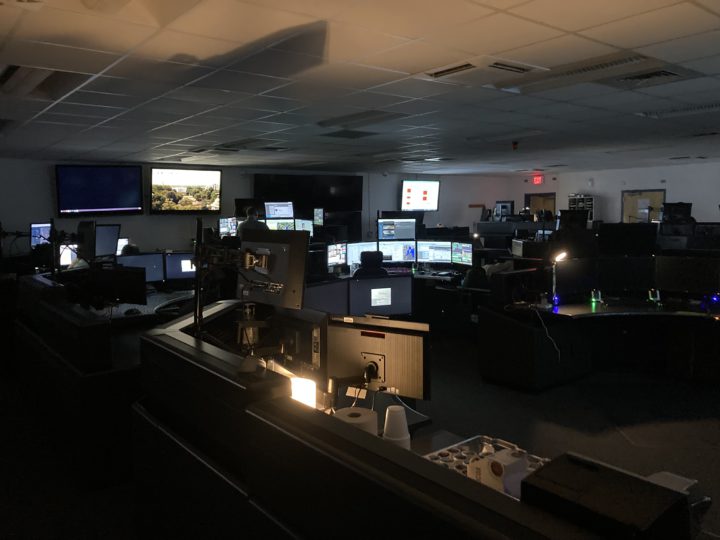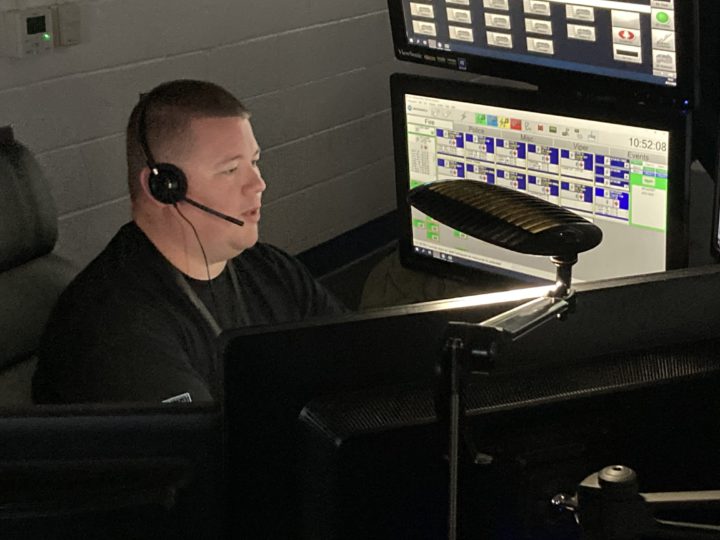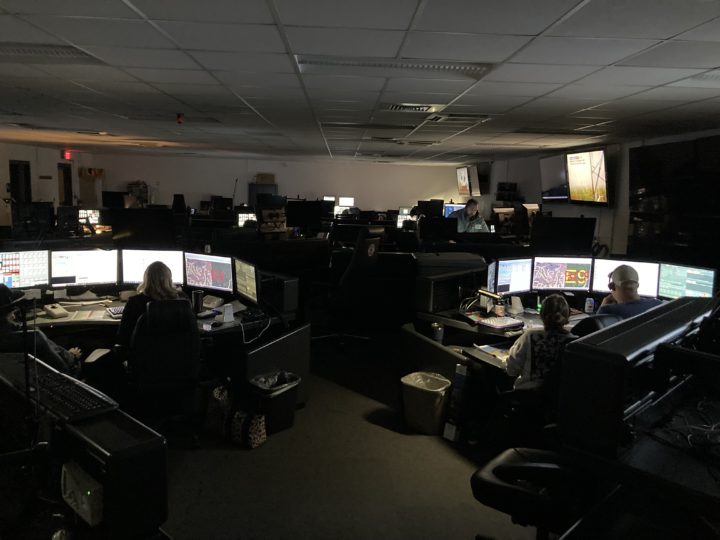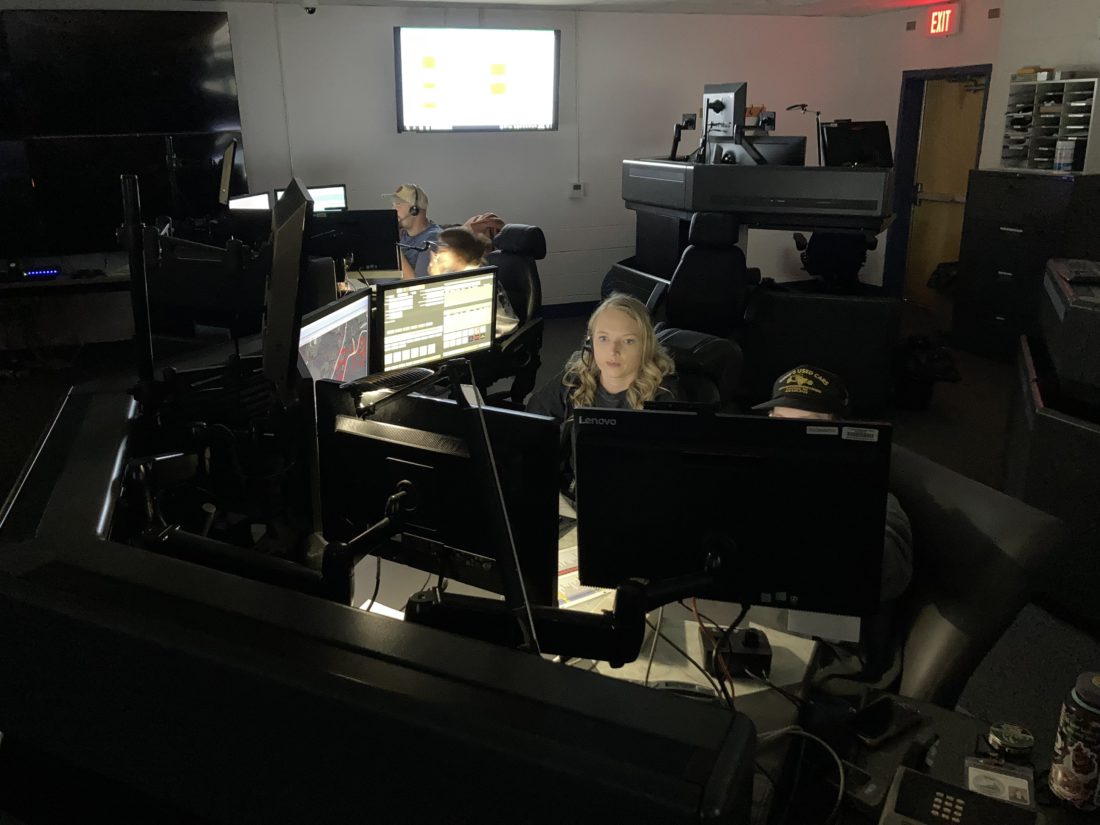There’s a wreck on Interstate 26 with an injury. A man is found dead at home by his wife. A firefighter is missing at the scene of a fire. A breathless caller is struggling for oxygen. These calls to 911 keep coming, and workers at the understaffed Buncombe County Public Safety Communications Center keep answering.
There’s usually not much time for breaks between calls to step outside or use the bathroom, so workers in the windowless, dark call center basically stay glued to their chairs.
“It’s very busy. Very, very busy,” says Shaina Harris, who has worked as a dispatcher in Buncombe County for two years.
“Most of the time, there’ll be anywhere from two to four of us on the phones, and then the rest of [the workers] will be dispatching [calls to first responders]. So when we get a huge call load, we’re taking calls back-to-back,” she says.
The center is so short-staffed that all supervisors, managers and quality assurance staff — everyone short of the director — have been moved to the floor to take calls until the center is appropriately staffed, putting on the back burner the duties outlined in their job descriptions.
“It’s currently a critical staffing situation at the 911 center,” Rafael Baptista, Buncombe County’s director of strategy and innovation, told the Buncombe County Board of Commissioners on March 21.
Almost 488,000 calls were handled in 2022 at the call center at 164 Erwin Hills Road, and about 190,000 of those were emergencies on the 911 line. That makes the call center the sixth-busiest 911 call center in the state, according to Baptista. Asheville is the seventh-largest metropolitan area in North Carolina, as of the 2020 census.
The remaining 298,000 calls were nonemergency calls seeking information or assistance from county staff — the fifth-highest volume for such calls in the state.
As of last month, the center was handling that volume with 32 of its 77 positions unfilled.
“It adds a lot of mental stress and physical stress to people. Sure, it’s overworking people. And unfortunately, it is very, very wearing to a point where we’re losing a lot of good people that have been here for a very long time,” Harris says.
The staffing issue is contributing to longer response times.
There typically are three main metrics on which to judge 911 call centers, Baptista told the commissioners at a board meeting in March. All are affected by being down 40% in call center staff.
- How fast calls are answered
- How fast the appropriate first responder is dispatched to the emergency
- How often errors are made by call takers and dispatchers
In April, more than 90% of calls were answered within 15 seconds, an improvement over the last several years and a rate that meets national benchmarks, says Derrick Ruble, director of the public safety communications center.

Once a call is received, the goal is to get a first responder dispatched to the scene within 64 seconds, Baptista says. As of March, Buncombe’s average dispatch time is 211 seconds, or 3 1/2 minutes.
Anecdotally, part of the response time issue is a lack of vehicle supply, Ruble says, as there are sometimes fewer ambulances available than the call volume demands. Specific data on ambulance supply wasn’t available at press time, according to Ruble.
But staffing issues are the primary reason, Baptista says.
The department doesn’t have information for the third metric, error rate, because quality assurance personnel are too busy working on the floor answering calls to track that data, Baptista says.
Different roles
Generally speaking, there are two main roles at the call center — taking calls from the general public and dispatching appropriate units to the scene, such as fire, police or emergency medical services.
First, a call taker fields an emergency call, learns what happened and where, and determines what agency should respond. A call taker then drops the information into the appropriate queue, where a dispatcher for that specific agency radios crews to respond to the scene.
Each agency, like the Asheville Police Department, Buncombe County Sheriff’s Office, city and county fire departments and EMS, has a different dispatch system, so each dispatcher must be trained on their system of focus. Some call takers, like Harris, are able to juggle both duties when needed, depending on staffing levels, but it can be difficult to stay on the line with callers in a desperate situation and communicate with first responders at the same time.
Harris has five or six monitors firing at once, with everything from CPR instructions to real-time traffic cameras and maps to help her juggle all the necessary communications of the job.
All this means being a call taker — as opposed to just a dispatcher — requires more extensive training. Ruble says it takes six to eight weeks before a trainee can even touch a radio or answer the phone and about six months of training to take calls on their own.
Existing call center staff members began receiving stipend pay in April to help them cope with the extended hours and stress. The pay extends until the center can fill 67% of its positions with in-house staff for at least three months.
Staff that has worked in the center for at least six months gets an extra $8 or $15 hourly for weekday shifts, and $12 or $20 extra per hour for weekend shifts, depending on the time of day worked. Pay starts at $18.90 an hour in the call center.
That, along with support from other agencies, has boosted morale, Ruble says.
‘A big family’
Asheville is not alone in its staffing woes; staffing issues are common across the country. One stopgap is using personnel from other agencies to help dispatch calls, allowing telecommunicators to focus on answering calls directly from the public.

Bradley Collins, a captain at Woodfin Fire Department, previously helped dispatch in Henderson County, so he was a natural fit to help fill in the last couple months. He offers to work one or two shifts a week at the call center on top of his normal duties as a fire captain, and he likes helping his colleagues, saying it helps bring the departments closer together.
“It’s extra work, but I like it. All of us first responders, we’re a big family. It’s good to see it from their side. It’s fun behind the scenes and stuff. I like it,” he says.
The out-of-department help is paid, including overtime hours, by their home department, which is then reimbursed by Buncombe County, Ruble says.
Buncombe County has benefited greatly from the dispatching help, Harris says.
“They’ve been a humongous help for us, humongous help. So if we have enough of them on dispatch channels, we can dedicate our time solely to [training a] new hire to work on taking calls,” Harris says.
While the extra assistance has been vital, it’s not quite the same as having full-time staff, Baptista says.
“The first responders from our local agencies are an incredible asset and we wouldn’t be able to do what we’re doing now without them and we’re incredibly grateful for them. But the reality is 911 telecommunicators are [professionals trained for] a specific job and the first responders who are in there, we’re training them to the best of our ability, but they’re not trained to the level of our own staff, so they are limited in the tasks they are able to perform within the 911 center,” he says.
In addition to enlisting help from other departments, Ruble is looking for staffing answers elsewhere.
He attended a conference on the topic in May, and is considering incorporating traveling dispatchers, a program similar to a traveling nurse program.
Ruble hopes two additional positions included in the proposed fiscal year 2023-24 budget — an administrative coordinator and a training and support specialist — will also help with his team’s workload.
Not a goal, but a necessity
Regardless of staffing and recruitment issues, working in a 911 call center requires a special person.
“One of the sayings in the industry is that less than 1% of the population has the skills to be a dispatcher. And less than 1% of the 1% can actually do the job. Just because you have the skills to do something, [doesn’t] mean you can do it. So it’s a limited pool of folks [who can do it],” Ruble says.
First and foremost, you have to stay calm in times of crisis, Harris says.
“If you cannot stay calm, this is not for you. Because that caller is calling in on their absolute worst possible day of their life. And if you can’t stay calm for them, you should not be on that phone because they are depending on us to stay calm for them. They are depending on us to handle that situation,” she says.

They’ve had calls from desperate people threatening to shoot themselves. Or a parent distraught that their child is not breathing, unsure of how to administer CPR.
Instances in which children are involved are the most emotional for Harris, she says.
Many times, the call center employees don’t get to hear the end of the story. They hear the initial panic from a caller, get emergency personnel on the way, and have to trust that they helped save someone’s life.
If a call is particularly upsetting, employees can go through a debriefing process with the other first responders to get closure, something Harris says is very valuable.
The debriefing, provided by the county, brings together the telecommunicator and first responders to talk through what happened with an in-house mediator. The process may not be for everyone, but Harris says it has helped her deal with the anxiety of not knowing what happened after she gets off the phone.
“What if I could have done more? Or what if I could have done something better?” Harris often wonders after a call. “But you’ve always got to trust in yourself that you’ve done everything you can and that’s why you [always have] to be sure that you follow standards and you follow protocols and you follow what you’ve been trained to do so that you you know, without a shadow of a doubt, that you have done everything that you’re able to [do] and you’ve not missed anything,” Harris says.
Despite the difficulties of the job, Harris loves it, and is proud of the assistance she is able to provide.
“I love helping people. And when they’re having the worst day of their life, I also love the adrenaline that I get from it. It is such an adrenaline rush to be able to handle these. Sometimes I’d rather be out there physically doing it, because it’s just like, again, such an adrenaline rush for me,” she says.
“Sometimes as stressful as it can be, it is the most rewarding job I’ve ever had.”




Okaaaay, and WHY is this happening? With unemployment at an all time low or whatever, where is everybody? Every business out there is short handed. Why?!! And what do we do about it? We are crippled socially and economically, and nobody (except APD who sites cost of living issues) is digging into why.
Very long hours, minimal time off, a windowless center, the emotional and physical challenges. ( try sitting in an office chair for 12 hours with minimal steps). The list goes on and on. Kudos to those that choose to stay and help the public. Truly the unsung hero’s of 9-1-1!
Partly because we have a very large retirement and tourist population in Asheville. The former means we have an unhealthy ratio of workers/non-workers. The latter means we have an unrealistic need to fill positions that wouldn’t otherwise exist. I also believe that, in general, diminished mental health in our society has much to with how attached humans are to gadgets rather than Nature.